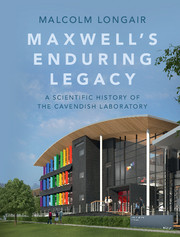Book contents
- Frontmatter
- Dedication
- Contents
- Preface
- Acknowledgements
- Part I To 1874
- Part II 1874 to 1879
- Part III 1879 to 1884
- Part IV 1884 to 1919
- Part V 1919 to 1937
- Part VI 1938 to 1953
- Part VII 1953 to 1971
- Part VIII 1971 to 1982
- Part IX 1984 to 1995
- 19 The Edwards era: a new epoch of expansion
- 20 The Edwards era: new directions in condensed matter physics
- 21 The Edwards era: high–energy physics and radio astronomy
- Part X 1995 to present
- Appendix The evolution of the New Museums site
- Notes
- References
- Author index
- Subject index
19 - The Edwards era: a new epoch of expansion
from Part IX - 1984 to 1995
Published online by Cambridge University Press: 05 July 2016
- Frontmatter
- Dedication
- Contents
- Preface
- Acknowledgements
- Part I To 1874
- Part II 1874 to 1879
- Part III 1879 to 1884
- Part IV 1884 to 1919
- Part V 1919 to 1937
- Part VI 1938 to 1953
- Part VII 1953 to 1971
- Part VIII 1971 to 1982
- Part IX 1984 to 1995
- 19 The Edwards era: a new epoch of expansion
- 20 The Edwards era: new directions in condensed matter physics
- 21 The Edwards era: high–energy physics and radio astronomy
- Part X 1995 to present
- Appendix The evolution of the New Museums site
- Notes
- References
- Author index
- Subject index
Summary
The interregnum between Pippard's resignation from the Cavendish Chair in 1982 and Sam Edwards’ assumption of the position in 1984 was covered by Alan Cook as Head of Department from 1979 to 1984. On his appointment, Edwards took on the role of Head of Department for the next five years. Unlike Pippard, Edwards had been deeply involved in national and international science politics for many years. He had served as a member of the Council of the European Physical Society from 1969 to 1971. He had been a member of various committees of the Science Research Council since 1968 and of the Council'sScience Board since 1970. In 1971 he was appointed a member of the University Grants Committee and was then Chairman of the Science Research Council from 1973 to 1977. This was followed by his Chairmanship of the Defence Scientific Council from 1977 to 1980, and he was Chief Scientific Adviser to the Department of Energy from 1983 to 1988. He had also served as Vice-President of the Royal Society and of the Institute of Physics, and had been President of the Institute of Mathematics. Thus, he had a very wide range of contacts in government and industry and used that experience to begin a major expansion of the Laboratory's activities, to remarkable effect. He was famous for hosting dinners for senior figures in industry and government in his college, Gonville and Caius College, where he had accumulated a superb, and large, wine collection. When I took over as Head of the Laboratory in 1997, his only advice to me was: ‘Have dinners!’
Expansion of the Laboratory's programme
During the Pippard era, the numbers of staff members remained roughly constant (see Figure 16.5(a)). New initiatives were needed and this was brought about largely through the vision of Edwards during his five-year term as Head of Department. The funding pressures on the University with the gradual erosion of support for research and the universities meant it was a major challenge to increase significantly the numbers of tenured academic posts, despite the ‘New Blood’ scheme initiated by the government to regenerate research and teaching activity in the universities.
- Type
- Chapter
- Information
- Maxwell's Enduring LegacyA Scientific History of the Cavendish Laboratory, pp. 459 - 466Publisher: Cambridge University PressPrint publication year: 2016



